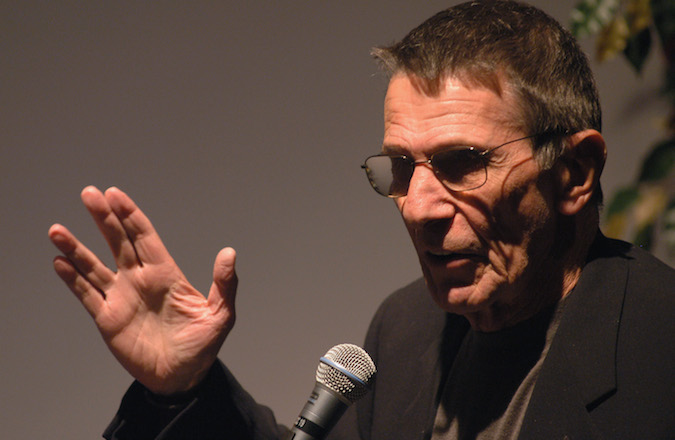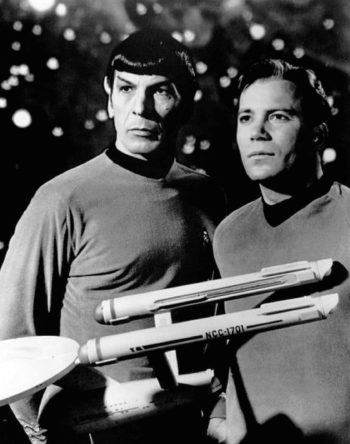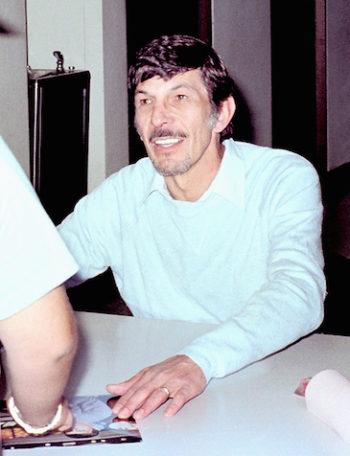Behind those pointy ears, a ‘nice, earnest Jewish boy’
Published March 2, 2015

Leonard Nimoy, shown here in 2002, devised Spock’s vulcan salute from a Jewish prayer. (Michel Boutefeu/Getty Images)
ADVERTISEMENT
This article was originally published in 1991. In the wake of Leonard Nimoy’s Feb. 27 death, the piece is being republished with the permission of the author.
(JTA) — As a struggling young actor in the early 1950s, Leonard Nimoy, inspired by the rebirth of the Jewish state and childhood memories of Zionist rallies in Boston Garden, considered making aliyah to join Habimah, Israel’s national theater.
Upon cooler reflection on the huge language barrier he would face, Nimoy dropped the idea and instead headed west to Hollywood.
Whatever the loss to the Hebrew theater, the decision vouchsafed to millions of “Star Trek” devotees that Nimoy would be at the right place at the right time to create the role of the semi-immortal Mr. Spock of the Starship Enterprise.
Although he can never escape his pointy-eared alter ego completely, there is a great deal more to Nimoy as an actor and a man. An old friend, Diane Johnson, has described him as “a nice, earnest Jewish boy, hard working, family oriented, undereducated for his intelligence, with the autodidact’s respect for the intellect and for literature.”
What does Nimoy think of the thumbnail sketch?
Sitting in a T-shirt and shorts on the patio of his rambling house in the posh Bel Air section of Los Angeles, a scuba mask and beach-ball paddles on the table, Nimoy leans back and laughs.
“She’s right on the nose, right on the nose,” he says. “I really screwed up on my education.”
ADVERTISEMENT
Nimoy is unusually relaxed. As executive producer of “Star Trek VI: The Undiscovered Country,” he has wound up the post-production chores on the film before its release in mid-December. And of course he is reprising his role as the eminently logical, half-human, half-Vulcan science officer aboard the Enterprise.
But otherwise, the relentlessly driven Nimoy is at peace with himself, perhaps for the first time in the 43 years since he made the irrevocable decision at age 17 to become an actor.
“I am turning down all new work and I’ve told my agent not to call me for at least a year,” says Nimoy, his lean, grave face validating his words. “I want to spend a great deal of time re-examining my life, my identity, my Jewishness. In the past, my identity was based on my job, but now I’m secure.
“I’m a very happy guy, with a new family and no financial cares. At 60, I have accomplished far more as an actor, writer, director and producer than I ever expected The tables are cleared and I am open to inspiration and choice.” Of course, he adds as a precaution, if a really exciting project pops up, he may take it.
It’s been a long road to the self-assured squire of Bel Air from a difficult childhood and adolescence in a middle-class section of Boston. Both his parents had arrived separately in the U.S. from the small Ukrainian town of Zaslav in the early 1920s. In Boston, father Max became a partner in a barbershop.
The Nimoy household kept kosher and was flexibly Orthodox: With Saturdays the busiest day in the barbershop, the father tended to his job. Nimoy’s studious older brother, Melvin, was clearly the parents’ favorite. When Nimoy gave the first inkling of his future calling by starring in a children’s play at 8, the father declared sternly that he hadn’t come all the way from Russia to America to see a son waste his life as an actor.
The family pecking order powerfully influenced Nimoy’s career.
“Family life made me a supporting player to my brother and later, as an actor, I continued to be most comfortable in that role,” he says. “I did not aspire to be the leading man but sought out the role of the outsider, the alien, who would be a secondary character.”
The sense of alienation was reinforced by growing up in a predominantly Italian-Catholic neighborhood.
“Being Jewish, I always sensed some element of difference, a separation,” Nimoy recalls.
His early psychological bent became irreversible — as did his decision to become an actor — when as a 17– year-old he landed his first real stage role as the teenage son, Ralphie, in Clifford Odets’ “Awake and Sing.” The play dramatized the struggles of a Jewish family, the Bergers, in the depth of the 1930s Depression.
“That was an amazing event,” Nimoy says. “That characters could talk about Jewish concerns on an American stage made me feel validated as a person and as a Jew. Berger in the play was my mother, desperately trying to control her family life to make it manageable. And my role as a young man, surrounded by a hostile and repressive environment, so touched a responsive chord that I decided to make a career of acting.”
Rather than attend college, Nimoy spent the next two years saving money as a vacuum-cleaner salesman; when he had enough he headed for Los Angeles. The family separation scene still makes him shudder.
‘It was terrible, a terribly emotional ordeal,” he says. “There were tears and fights and arguments up to the last minute. I left with a lot of pain.”
Out West, Nimoy enrolled in acting classes at the Pasadena Playhouse and, as one of the few youthful Yiddish speakers in town, picked up a few dollars in minor roles whenever a Yiddish theater troupe came to town.
“I was in a play with the great Maurice Schwartz, the most famous Yiddish actor of his time, and hoping to gain some credibility in the eyes of my parents, I asked him to write a letter to them saying that I was doing all right. And he did so,” Nimoy says.
Very slowly, Nimoy’s career started to take off. At 21, he snagged his first major film role, playing another kind of outsider, a disfigured boxer, in the long-forgotten “Kid Monk Baroni.” Other roles followed in “Queen for a Day,” “Rhubarb” and, as an Indian heavy, in “The Old Overland Trail.”
One thing Nimoy appreciated about Hollywood was the pervasive Jewish influence in the film industry, which dampened any blatant expressions of anti-Semitism.
“At least I didn’t have to hear such terms as ‘dirty kike’ as l did in Boston,” he says.
After a two-year stint in the army, Nimoy was discharged in 1956 to face one of the lowest points of his life. He couldn’t find an acting job and his wife, Sandi, was expecting their second child. For a while, Nimoy would make a precarious living as a taxi driver.
He gradually found more roles in the movies and theater, but the watershed event in Nimoy’s life came in 1965 when he was cast as Spock in what would become the enormously successful “Star Trek” television series and subsequent motion pictures.
An early report on “Star Trek” noted that it “has built up a cult following that rivals an organized religion in the number and fanaticism of its followers, known as ‘trekkies.’”
Nimoy, as the rational, pointy-eared Spock, quickly became a pop hero. Hundreds of thousands of admirers were grief stricken when their idol seemed lost forever at the end of the film “Star Trek II: The Wrath of Khan.” To calm the furor, Paramount Pictures quickly announced a sequel, “Star Trek III: The Search for Spock.”
Has the “Star Trek” phenomenon been a curse or a blessing?
“Both,” Nimoy says jocularly before quickly changing his tone and adding, “I shouldn’t be facetious about this.” Spock’s fame “has given me an entree and influence, the chance to translate my abilities into other kinds of work, to play in the theater because they know that I can sell tickets.”
Indeed, given the opportunity, Nimoy has demonstrated a versatility even he may not have suspected. He has become a respected film director, listing among his credits “Star Trek III” and “Star Trek IV,” the blockbuster hit “Three Men and a Baby” and “Funny About Love.”
On stage he has starred on Broadway in “Equus” and as actor, director and producer of “Vincent,” a one-man play about another alienated hero, Vincent van Gogh. He derived perhaps his greatest satisfaction from the role of Tevye in “Fiddler on the Roof” during an eight-week run in New England, not least because it allowed his parents to view their son as an actor for the first time since he left home.
Nimoy has been a highly regarded acting teacher and, in a little-known side of the man, the author of three volumes of poetry, illustrated with his own photographs. He has recorded 10 narrative albums and, in 1975, wrote his autobiography, which was titled somewhat plaintively “I Am Not Spock.”
At the same time. Nimoy has branched out into television movies. He warmly remembers his part as Golda Meir’s husband, Morris Myerson, in “A Woman Called Golda,” because it gave him a chance to both revisit Israel, where the film was shot, and to play opposite Ingrid Bergman shortly before her death. The performance as Morris brought him one of his four Emmy nominations.
Earlier this year, Nimoy scored a critical success in a role that offered him the opportunity to express both his affinity to the stubborn loner in a hostile environment and his Jewishness. In the television movie “Never Forget,” based on actual events, he portrayed Mel Mermelstein, a 64-year-old Holocaust survivor who won a dramatic and drawn-out legal battle against a group of neo-Nazi revisionists who claimed that the Holocaust was a “Jewish hoax.”
The experience deepened his study of the Holocaust. Lying on his living room table were two books about the era, “The War Against the Jews” by Lucy Davidowicz, and “Beyond Belief ” by Deborah Lipstadt, next to Ben Shahn’s illustrated “Haggada.”
Amid the professional success, some painful personal problems that had been building for some time came to a head four to five years ago. A New York Times reporter and family friend wrote later that by the mid-1980s, Nimoy “guiltily played the roles of husband in a marriage that had grown stale and son to immigrant parents he could never satisfy. … In December 1986, he walked out on his wife of 33 years. In 1987, his father died and his mother six months later.”
It is understandably a time and memory that Nimoy does not enjoy discussing, but asked to comment on the quote, he says that “it is a way of looking at it, but it’s not the whole story, obviously.”
On New Year’s Day 1989, Nimoy married Susan Bay, and the couple attend services at Temple Israel of Hollywood, a Reform congregation, where Susan’s cousin, John Roscove, is the senior rabbi. Though not a particularly religious man, Nimoy feels that “everything I do is informed by my Judaism. A lot of what I’ve put into Spock came to me through my Jewish orientation.”
As one example, Nimoy modeled the Vulcan hand greeting, which expresses “Live long and prosper,” on the gesture still seen in Orthodox synagogues during the blessing of the kohanim (priestly class).
At 60, Nimoy appears the contented paterfamilias who enjoys talking about the doings of his 10-year-old stepson, Aaron; his son, Adam, a lawyer; his daughter Julie; and his three grandchildren.
It is a languid, sunny day in Nimoy’s densely foliaged backyard; Hollywood seems far away. So one can almost accept the man’s protestations that the next year will be devoted to introspection and contemplation.
Of course, the former anti-Vietnam war and pro-civil rights activist is still involved in civic and political advocacy, though now with his wife mainly in environmental, women’s rights and pro-choice causes. Also, he and Susan are planning a joint photographic research project on how people over 60 deal with the aging process.
In late November, Nimoy will travel to England to address the prestigious Oxford Union on his film career.
Will the now 25-year-old saga of Spock and “Star Trek” ever end? The studio has announced that “Star Trek VI” will be the absolutely final film in the series. But Nimoy points out that “people are skeptical, and for good reason. … We have seen the supposed end again and again.”
In Hollywood, the smart money is betting that despite his sincere affirmations, Leonard Nimoy’s name will pop up in screen and stage credits again in the not-too-distant future, to the delight of his fans.
![]()

















